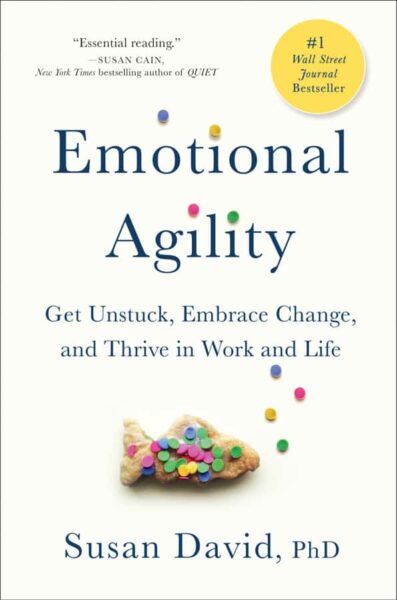There have been some good business books I’ve read and some bad. There aren’t too many in the middle which I can’t say were excellent and I also can’t say they’re bad.
The most recent business-related book I’ve read, Emotional Agility by Susan David is right in the middle. It was well-written but at times it was a bit on the academic side. She’s just too smart for her own good to connect with a basic mind such as my own.
There were times when I think the book went so over my head that I tended to tune out a bit. I thought there was some useful tips in the book when I did follow but I’m not sure any of it was memorable enough for me to recall without going over some of my notes.
Even my notes were a bit sparse on emotional agility. It’s either because I already practice emotional agility or I’m so immature that I’ll never achieve emotional agility 🙂
The one thing that I did love about the book is that Susan David called out self-help books as the track heap garbage that they are. No, she didn’t call them that as she’s too smart (and diplomatic) to say it the way I just did.
Self-help books are often garbage, though. They talk about thinking a certain way of thinking and changing your thinking to achieve certain results. It’s just not that easy. You know, people like Tony Robbins are a total joke because everything becomes just a mindset that’s easy to change.
This book doesn’t treat helping achieve emotional agility in a self-help kind of way at all. She provides real stories and real ways of modifying your thinking that we’re actually able to achieve. It’s not just up to us thinking it and doing it that will change us. If we can’t think it and then do it then we’re a failure according to most self-help books.
If we don’t achieve their results then we didn’t work hard enough or try hard enough. BS. Emotional Agility doesn’t treat things this way as there is real science behind it.
I like that about this book.
The book also presents an interesting way of thinking about stress. Here’s one of my favorite quotes:
Denying stress, bottling it, or brooding about it is counterproductive. Avoiding stress is impossible, but what we can do is adjust our relationship to stress. It doesn’t have to own us. We can own it.
Excerpt From: Emotional Agility by Susan David
Stress is inevitable, and we just have to adjust our relationship with it instead of eliminate it. Good advice. It’s not about bottling it up or just letting it all go to some innocent bystandard. Neither way is the best way which you’ll learn in the book. There is a third and ideal way.
So, while this isn’t my favorite book or far from the worst book I’ve read, it’s still worth the read. You may find yourself tuning out at times but that’s okay, you’ll still get some good information from the book.
Up Next
I actually finished Emotional Agility a few days ago but just hadn’t written about it yet. So, I’m pretty well into the next book I’m reading, Instructions for a Heatwave by Maggie O’Farrell.
It started out a bit awkward but I soon got into the flow it if. It’s an excellent book if you can decipher some British terms that aren’t common in the US. Luckily I’m reading in Apple Books, so I can get the definition of the words or more context right as I’m reading.
One word I’m kind of embarrassed I had to look up because it’s so obvious once you look it up is lino. It’s just that I’ve never heard linoleum referred to as lino. Obvious, right? Not so much when you’re already processing many differences between British English and US English.
It’s a good book, though. Very entertaining and I’d already recommend reading it.

